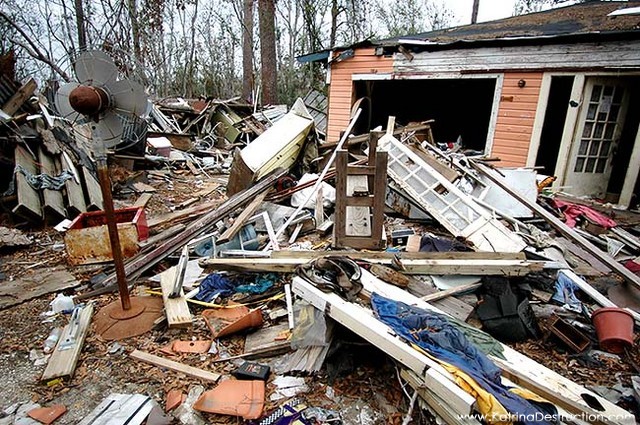 Editor’s note (Doug Burke): Many respected climate scientists agree that a long-term carbon dioxide (CO2) level of more than 350 parts per million may cause climate change severe enough to destabilize established climate patterns and threaten our ecosystem. The current CO2 level is over 390 and rising. Climate change is anticipated to result in severe weather events, inundation of coastal areas, drought, failure of agriculture and water supply, and ultimately cause forced migrations, political upheavals and conflict over resources.
Editor’s note (Doug Burke): Many respected climate scientists agree that a long-term carbon dioxide (CO2) level of more than 350 parts per million may cause climate change severe enough to destabilize established climate patterns and threaten our ecosystem. The current CO2 level is over 390 and rising. Climate change is anticipated to result in severe weather events, inundation of coastal areas, drought, failure of agriculture and water supply, and ultimately cause forced migrations, political upheavals and conflict over resources.
The Case for a Carbon Tax[1] by Kenneth O'Hare
The carbon dioxide already in the Earth’s atmosphere and being added daily is destabilizing established climate patterns and threatening the ecosystems on which all living beings depend. Very large and rapid reductions in carbon emissions are essential. The most immediate, effective, and transparent policy to reverse carbon dioxide build-up is a a tax on the carbon content of fossil fuels.
Companies would compete to become more energy efficient
Such a measure would levy a simple per-ton tax on the carbon content of fossil fuels at the wellhead, mine head, or dock. Inevitably, fossil fuel companies would add the amount of the tax to the cost of the fuel they sell, raising the price of these fuels, along with the downstream prices of a broad array of products and services that currently depend on fossil fuels. To cope with higher prices, companies that use fossil fuels would compete to become more energy efficient and change their energy sources to renewable.
A large and growing number of economists, policy-makers and leaders across the political spectrum regard stiff taxes on carbon as essential for combating the climate crisis. Among the supporters of various forms of a carbon tax are Jim Hansen of NASA, Lester Brown of Earth Policy Institute, Carl Pope of the Sierra Club, economists Joe Stiglitz, Robert Reich, Jeff Sachs, and Alan Blinder, along with a majority of economists polled by the Wall Street Journal.[2] Surprisingly, supporters also include prominent conservatives such as columnist Charles Krauthammer, Peter Van Doren of the Cato Institute, Irwin Stelzer of the Hudson Institute, and Harvard economist Gregory Mankiw. A report from the conservative American Enterprise Institute has called for a high and rising CO2 price.
But, the U.S. has not been a leader in converting this body of informed opinion into tax law. Internationally, we are behind the curve. To date, carbon taxes have been enacted in Australia (2011), Finland (1990), and Sweden (1991). Boulder, Colorado implemented the United States’ first tax on carbon emissions from electricity, and Quebec province began collecting a carbon tax on “hydrocarbons” (petroleum, natural gas and coal), both in 2007. British Columbia inaugurated a revenue-neutral carbon tax in 2008. In Great Britain a Conservative Party leader has called for a “carbon levy” based on the carbon content of fuels. This February South Africa announced plans for a carbon tax to take effect in 2013. In the U.S., the “Save Our Climate Act of 2011” (H.R. 3242), which would establish a carbon tax and rebate most of the funds to families, has been introduced in the House.[3]
Why A Carbon Tax?
Currently, the prices of gasoline, electricity and fuels in general include none of the costs associated with climate change. This means industry dumps the most dangerous pollutant there is – CO2 – into our common atmosphere for free. This omission suppresses incentives to develop and deploy carbon-reducing measures such as energy efficiency (high-mileage cars and high-efficiency heaters and air conditioners), renewable energy (wind turbines, solar panels), low-carbon fuels (biofuels from high-cellulose plants), and conservation-based behavior such as bicycling, recycling and overall mindfulness toward energy consumption. Conversely, taxing fuels according to their carbon content will infuse these incentives at every link in the chain of decision and action — from individuals’ choices and uses of vehicles, appliances, and housing, to businesses’ choices of new product design, capital investment and facilities location, and governments’ choices in regulatory policy, land use and taxation. Fossil fuels seem cheaper than renewables like wind and solar only because we ignore the massive costs of pollution in extraction and burning, and the threat of climate change. A carbon tax would begin to price fossil fuels closer to their real cost.
A carbon tax won’t stop global climate change by itself. But without a carbon tax, even the most aggressive regulatory regime such as high mileage standards for cars, and subsidies such as tax credits for efficiency and renewable, will fall woefully short of the necessary reductions in carbon emissions.
 Not a Tax Increase
Not a Tax Increase
A carbon tax should be “revenue-neutral.” Revenue-neutral means that little if any of the tax revenues raised by taxing carbon emissions would be retained by government. The vast majority of the revenues would be returned to the public, with, perhaps, a very small amount utilized to mitigate the otherwise negative impacts of carbon taxes on low-income energy users. Two primary return approaches are being discussed. One would return the revenues directly through regularly scheduled, equal “rebates” of the tax to all U.S. residents. (Just such a rebate program has operated in Alaska for three decades, providing residents with annual dividends from the state’s North Slope oil revenues.)
In the other method, carbon tax revenue would trigger reduction in existing taxes such as the federal payroll tax. This “tax-shift” approach, while less direct than the rebate method, would also ensure that the carbon tax is revenue-neutral and could offer other benefits. For example, reducing payroll taxes could stimulate employment. Revenue-neutrality not only protects the poor, it’s also politically savvy since it blunts the “No New Taxes” demand that has held sway in American politics for over a generation.
Softening The Impact
A carbon tax, like any flat tax, is regressive — by itself. However, the regressivity of a carbon tax can be minimized, and perhaps eliminated altogether, by keeping the tax revenue-neutral in a way that protects the less affluent. The operative fact is that wealthier households use more energy. They generally drive and fly more, have more and bigger houses, and buy more stuff that requires energy to manufacture and use. As a result, most of the costs of a carbon tax will be passed on to families of above-average means, along with corporations and government, if they choose to continue using fossil fuel-intensive goods and services.
That is why the two “return” approaches discussed above — carbon rebates or tax-shifting — can turn the carbon tax into a progressive tax. Because income and energy consumption are strongly correlated, most poor households will get more back in carbon tax rebates than they will pay in the increased prices that will result from the carbon tax.
Cap-and-Trade Problems
A tax on carbon emissions isn’t the only way to “put a price on carbon” and thereby provide incentives to reduce use of high-carbon fuels. Some prominent politicians, corporations and environmental groups have supported a carbon cap-and-trade system. The U.S. sulfur dioxide cap-and-trade system instituted in the early 1990s deserves some of the credit for efficiently reducing acid rain emissions from power plants. But, a carbon tax is superior to a carbon cap-and-trade system, for five fundamental reasons:
- Carbon taxes will lend predictability to energy prices, whereas cap-and-trade systems exacerbate the price volatility that historically has discouraged investments in less carbon-intensive electricity.
- Carbon taxes can be implemented much sooner than complex cap-and-trade systems. Because of the urgency of the climate crisis, we do not have the luxury of waiting while the myriad details of a complex cap-and-trade system are resolved through lengthy negotiations.
- Carbon taxes are transparent and easily understandable, making them more likely to elicit the necessary public support than an opaque and difficult to understand cap-and-trade system.
- Carbon taxes can be implemented with far less opportunity for manipulation by special interests, while a cap-and-trade system’s complexity opens it to exploitation by special interests and perverse incentives that can undermine public confidence and undercut its effectiveness.
- Carbon tax revenues can be rebated to the public through rebates or tax-shifting, while the costs of cap-and-trade systems are likely to become a hidden tax as dollars flow to market participants, lawyers and consultants.
Public Support for a Carbon Tax
The Carbon Tax Center recently reported that most Americans now support a carbon tax.[4]
Sixty-five percent of Americans now support a modest revenue-neutral carbon tax to reduce pollution and create jobs, according to a survey of one thousand American adults conducted jointly last month by the Yale Project on Climate Communication and the George Mason University Center for Climate Change Communication. This is the first poll we have seen showing that a majority of Americans support a carbon tax.
Majority support for a carbon tax spanned the political spectrum in the Yale-George Mason poll, with 51% of self-identified Republicans, 69% of independents and 77% of Democrats supporting a carbon tax with revenue returned as lower taxes.
Opportunities for Action
Citizens Climate Lobby, a public interest group with over 50 chapters in the U.S. and Canada, advocates for carbon tax and rebate legislation. Individuals who may be interested in adding their voice in support can visit www.citizensclimatelobby.org for information on how to get involved. For a synopsis of federal tax and rebate legislation proposed by the Citizens Climate Lobby, go to http://www.citizensclimatelobby.org/files/images/FeeAndDividendLegProposal081811.pdf.
[1] This article is adapted from articles entitled “What is a Carbon Tax?” and "Why a Carbon Tax?” posted by the Carbon Tax Center, and authorized for reprinting and adaptation under Creative Commons license. This article may be reprinted and adapted under the terms of the same Creative Commons license.
[2] See http://www.carbontax.org/who-supports/scientists-and-economists/ for the results of a poll conducted by the The Wall Street Journal in 2007.
[3] See www.gov.track.us/congress/bills/112/hr3242 for the text of the bill.
[4] Handley, James. Majority in U.S. Support Revenue-Neutral Carbon Tax. www.carbontaxcenter.org December 2, 2011.

